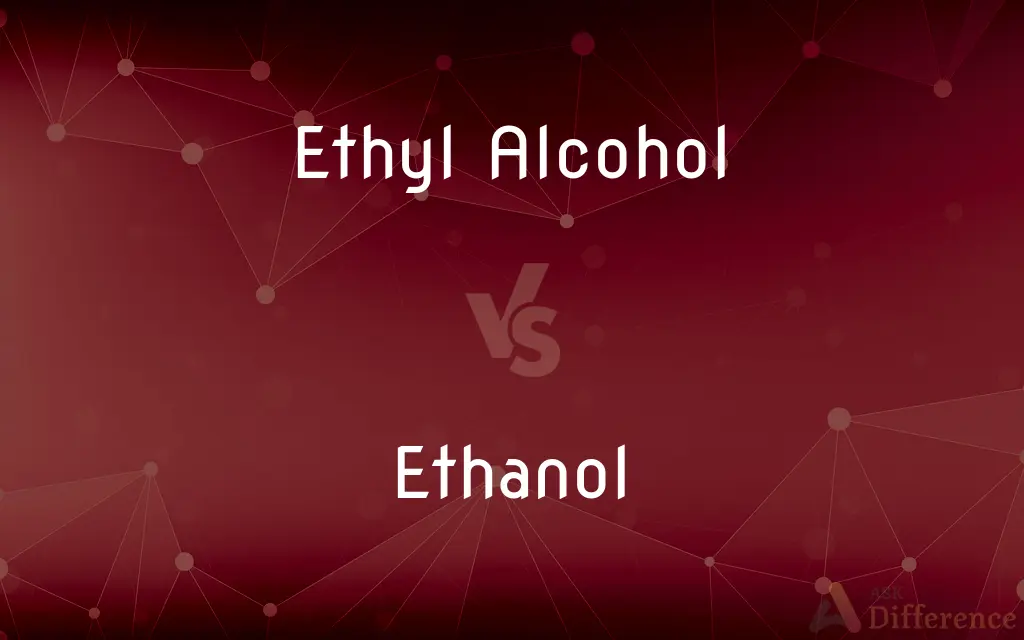Ethyl Alcohol vs. Ethanol — What's the Difference?
By Tayyaba Rehman — Published on December 5, 2023
Ethyl Alcohol and Ethanol refer to the same chemical compound (C2H5OH); the former is a common name, while the latter is the IUPAC name.

Difference Between Ethyl Alcohol and Ethanol
Table of Contents
ADVERTISEMENT
Key Differences
Ethyl Alcohol is a term often used in everyday language to describe a specific type of alcohol that humans consume. On the other hand, Ethanol is the scientific term recognized by the International Union of Pure and Applied Chemistry (IUPAC) for the same compound.
While Ethyl Alcohol conveys the idea of an alcohol derived from ethane, Ethanol is a more systematic representation and aligns with nomenclature rules for naming chemical compounds.
Ethyl Alcohol is a term that might be seen on product labels, especially in the context of beverages or pharmaceutical products. In contrast, Ethanol is more likely to be used in academic papers, scientific literature, and industrial contexts.
Many people commonly refer to Ethyl Alcohol when discussing alcoholic drinks or when mentioning the active ingredient in hand sanitizers. Meanwhile, Ethanol is the term you'd likely encounter in biofuel discussions or when addressing its role as a solvent in labs.
Both Ethyl Alcohol and Ethanol denote the same molecular structure, and in a chemical sense, they are identical. The difference lies primarily in the context in which they are used.
ADVERTISEMENT
Comparison Chart
Naming Convention
Common name
IUPAC name
Usage Context
Everyday language, product labels
Scientific literature, industrial contexts
Derivation
Suggests an alcohol from ethane
Systematic naming according to IUPAC
Common Associations
Alcoholic beverages, hand sanitizers
Biofuel, solvent in labs
Chemical Structure
C2H5OH
C2H5OH
Compare with Definitions
Ethyl Alcohol
A type of alcohol safe for human consumption.
Ethyl Alcohol is the primary ingredient in many alcoholic beverages.
Ethanol
The IUPAC name for the alcohol with the formula C2H5OH.
Ethanol is produced during the fermentation of sugars by yeast.
Ethyl Alcohol
A volatile, flammable liquid used in industries.
Ethyl Alcohol serves as an excellent solvent for many organic compounds.
Ethanol
A common laboratory solvent.
Ethanol is essential for many chemical reactions in the lab.
Ethyl Alcohol
A compound with a characteristic intoxicating effect when consumed.
Overconsumption of Ethyl Alcohol can lead to impaired judgment.
Ethanol
An antiseptic used in medical applications.
Ethanol can disinfect surfaces and prevent the spread of pathogens.
Ethyl Alcohol
An organic compound derived from ethane.
When ethane is subjected to hydration, it produces Ethyl Alcohol.
Ethanol
A biofuel used as an alternative to gasoline.
Cars can run on an Ethanol blend, reducing carbon emissions.
Ethyl Alcohol
The active component in many hand sanitizers.
Hand sanitizers contain a high concentration of Ethyl Alcohol to kill germs.
Ethanol
See alcohol.
Ethanol
(organic compound) A simple aliphatic alcohol formally derived from ethane by replacing one hydrogen atom with a hydroxyl group: CH3-CH2-OH.
Ethanol
Specifically, this alcohol as a fuel.
Ethanol
The organic compound C2H5.OH, the common alcohol which is the intoxicating agent in beer, wine, and other fermented and distilled liquors; called also ethyl alcohol. It is used pure or denatured as a solvent or in medicines and colognes and cleaning solutions, or mixed in gasoline as a fuel for automobiles, and as a rocket fuel (as in the V-2 rocket).
Ethanol
The intoxicating agent in fermented and distilled liquors; used pure or denatured as a solvent or in medicines and colognes and cleaning solutions and rocket fuel; proposed as a renewable clean-burning additive to gasoline
Ethanol
The psychoactive substance in alcoholic beverages.
Drinking Ethanol affects the central nervous system, leading to feelings of euphoria.
Common Curiosities
Are Ethyl Alcohol and Ethanol the same?
Yes, they refer to the same chemical compound, C2H5OH.
Why is Ethanol included in hand sanitizers?
Ethanol can kill many types of germs and viruses on contact.
What happens when Ethanol is burned?
When burned, Ethanol produces carbon dioxide and water.
What are the effects of drinking Ethanol?
Drinking Ethanol can lead to intoxication, impaired judgment, and euphoria.
Is Ethyl Alcohol found in all alcoholic drinks?
Yes, Ethyl Alcohol or Ethanol is the primary intoxicating ingredient.
How is Ethanol used outside of beverages?
Ethanol is used as a biofuel, solvent, and antiseptic, among other applications.
How are Ethyl Alcohol and Ethanol differentiated in chemistry?
They aren't; they refer to the same compound, but Ethanol is the preferred scientific term.
Is Ethyl Alcohol safe to drink in all forms?
No, only food-grade Ethyl Alcohol should be consumed. Industrial versions may contain impurities.
Is Ethyl Alcohol found in any products besides beverages?
Yes, Ethyl Alcohol is in sanitizers, some medications, and many industrial products.
What is Ethyl Alcohol?
It's a type of alcohol, commonly known as Ethanol, safe for human consumption.
Why are there two names for the same compound?
Ethyl Alcohol is a common name, while Ethanol is the IUPAC scientific name.
Can Ethyl Alcohol be used as a fuel?
Yes, Ethyl Alcohol or Ethanol is used as a biofuel.
Is Ethyl Alcohol used in cleaning products?
Yes, due to its solvent properties, Ethyl Alcohol is used in many cleaning agents.
How is the purity of Ethanol measured?
It's measured by its alcohol content, with 100% Ethanol being the purest form.
How is Ethanol produced on a large scale?
Ethanol is often produced through the fermentation of sugars by yeast.
Share Your Discovery

Previous Comparison
American Bulldog vs. Pit Bull
Next Comparison
Finite Verbs vs. Nonfinite VerbsAuthor Spotlight
Written by
Tayyaba RehmanTayyaba Rehman is a distinguished writer, currently serving as a primary contributor to askdifference.com. As a researcher in semantics and etymology, Tayyaba's passion for the complexity of languages and their distinctions has found a perfect home on the platform. Tayyaba delves into the intricacies of language, distinguishing between commonly confused words and phrases, thereby providing clarity for readers worldwide.













































